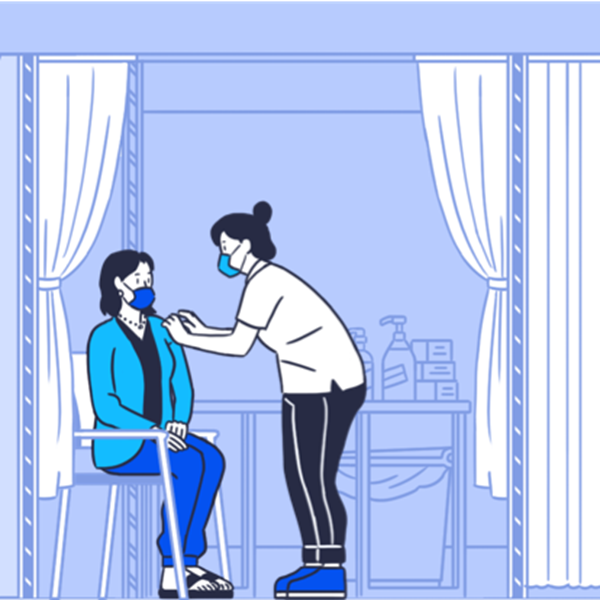Getting vaccinated to limit infections: The vaccines for coronavirus are effective and safe. All HMOs have them available.
-
COVID-19 Vaccine
What vaccines are approved for use in Israel, who is eligible to receive the vaccine, and where can you get vaccinated -
FAQ About the New Vaccine for the Omicron Variants
How is the vaccine different from the former ones? If I got vaccinated last year, should I get vaccinated again? How will the vaccine protect me? All the information about… -
COVID-19 Vaccine for Children
What vaccine is administered to children, is it safe and how effective is it? -
COVID-19 Vaccine for Toddlers
The Ministry of Health recommends vaccines for toddlers aged 6 months and older if they are at-risk for underlying diseases -
FAQs about the COVID-19 Vaccine for Children and Toddlers
FAQs about the COVID-19 Vaccine for Children and Toddlers -
Who Is Considered Vaccinated
Those vaccinated in Israel or abroad according to the guidance -
Vaccine Types and How They Work
The COVID vaccines approved in Israel provide protection in a variety of ways
FAQs about the COVID-19 Vaccine for Children and Toddlers
Why vaccinate children and toddlers if they usually develop a mild illness?
- To avoid the risk of severe illness: Even though the risk of severe illness among toddlers and children infected with coronavirus is lower than among adults, some children develop severe illness, even without pre-existing conditions. Figures show that for every 900 children confirmed as COVID-19 positive, one will develop a severe illness and will require hospital care.
- To avoid long-term complications: Even after recovery from COVID-19, there are risks of complications and medium-term and long-term side effects, which include heart conditions and neurological issues, such as:
PIMS: This syndrome is considered to be the most serious complication of infection with coronavirus in children and teenagers, and it might be a life-threatening illness (most children with this condition arrive in intensive care units, and 1% to 2% of them die). 70%-80% of children suffering from this syndrome do not have any pre-existing conditions.
Long COVID – One in 8 recovered children continues to suffer from symptoms that linger for more 4 weeks after the acute disease stage, such as fatigue, muscle and joint pains, headaches, insomnia and breathing problems. Recent studies show a rise in other neurological symptoms, such as seizures, memory disorders, and "Alzheimer's-like" changes in imaging tests that are considered a risk factor for subsequent neurological disorders. Additionally, most countries of the world are experiencing an increase in diabetes among children recovering from COVID-19.
In addition to already documented effects, there is room for concern that similarly to other viral diseases, such as measles, mumps or hepatitis, COVID-19 may also have effects or complications that appear long after infection, sometimes even years after, even if during the infectious stage, symptoms were mild or there were no symptoms whatsoever. - To reduce infection and severe illness:
The study shows that, in spite of the downward trend in infection protection, children and toddlers who were vaccinated have a high level of protection against serious illness, hospitalizations, and death, along with a moderate reduction in infection risk.
FAQs from parents on the pediatric vaccine >
Maybe we should wait a while longer with vaccination?
A vaccine series must be completed in order to achieve the optimal level of protection. Because the trend of infection persists even after waves of morbidity, it is best to vaccinate the children immediately and not wait for the next wave to arrive.
CDC data indicates that approximately 50% of severe morbidity, hospitalizations, and mortality occur in healthy children. The Ministry of Health permits every parent to vaccinate their children from six months of age and older, regardless of whether they are at increased risk of serious illness due to underlying diseases, birth defects, or immunosuppression
Is the pediatric vaccine safe and effective?
Both of the vaccines have received the FDA (the American Food and Drug Administration) for children aged 6 months to 5 years. In accordance with the clinical data among this group, on which the FDA's approval was based, it was found that the vaccine was highly safe with high efficacy in preventing symptomatic illness, severe illness, hospitalization or death.
You should know: Vaccination does not adversely affect either growth or fertility, and children can be vaccinated with it with no concern.
What are the side effects of the vaccine observed in children?
Side effects observed among children ages 6 months to 5 years include: agitation, appetite loss, drowsiness, local pain in the injection site, fever and swollen lymph nodes (rare).
Side effects observed after vaccination of children ages 2 to 4 years: local pain in the injection site, fatigue, swelling and redness, headaches, fever and swollen lymph nodes (rare).
When compared with children who had previously recovered from COVID-19, there was no significant difference in the profile of symptoms around vaccination.
Is there any link between the vaccine and myocarditis and pericarditis?
Inflammation of the heart muscle (myocarditis) or the pericardium (pericarditis) is a rare phenomenon that usually appears following viral diseases.
According studies, myocarditis that developed following vaccination is an exceedingly rare side effect that usually involves mild clinical symptoms that pass after a short while, without leaving any long term damages to the heart muscle and its function.
In contrast, coronavirus may cause damage to the heart both during active illness and in the long run, in the form of pediatric inflammatory multisystem syndrome (PIMS) that occurs weeks after recovery.
The risk for myocarditis as a result of infection with coronavirus is about 3-4 times higher compared to myocarditis as a side effect of vaccination.
The vaccine should not be administered at this point to toddlers under 5 who have suffered an episode of myocarditis in the past, close to receiving the vaccine, or regardless of the vaccine.

